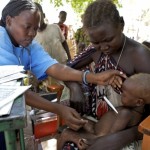
As David Cameron prepares to pledge millions of UK aid towards vaccines at a conference on June 13th, international health charity Merlin urges the money to be spent where the most children’s lives will be saved.
50 per cent of all children who die before their fifth birthday are born in forgotten or conflict-ridden countries such as Afghanistan, the Central African Republic and Somalia.
Afghanistan has the world’s second highest number of child deaths with nearly 20 per cent of Afghan children dying before their fifth birthday.
Yet fragile states are not prioritised or even meaningfully supported within the Global Alliance for Vaccines and Immunisation (GAVI), the international body of which the UK is the largest government donor and which is co-hosting the pledging conference in London.
Really pledging to save the lives of the world’s most vulnerable children?
GAVI is seeking an additional $3.7billion to help secure the roll-out of the new Pneumoccol and Rotavirus vaccines which target pneumonia and diarrhoea – the two biggest killers of children in the developing world.
Currently, the combined cost, without administration fees, is around $31 per child.
Yet Afghanistan spends an average of just $15 per person on health per year.
GAVI’s model – demand-driven and requiring recipient countries to stump up a healthy proportion of their own money to cover costs– makes it almost impossible for these new vaccines to be rolled out in the very countries where they are most needed.
Poor targeting: the biggest barrier to saving lives
To have any real chance of saving the lives of the world’s most vulnerable children and meet the fourth global Millennium Development Goal target, the UK government must demand a greater focus on fragile states.
To make these new vaccines a financial possibility, GAVI’s eligibility criteria must also be radically changed to give crisis countries the support they desperately need.
Merlin’s Director of Health and Policy Linda Doull says:
“Weak health systems are no justification for inaction. Yes, it’s more difficult to vaccinate children in these countries but it’s doable and Merlin is doing just that every single day.
The UK government could – and should – lead the world in seizing this opportunity to save the lives of the most vulnerable children. This is not only about addressing the greatest needs, it’s also about ensuring the most efficient use of UK aid.
50 per cent of children who die live in some of the most isolated areas of already vulnerable countries. Isn’t their survival every bit as important as any other child’s?”
Source: Merlin

















